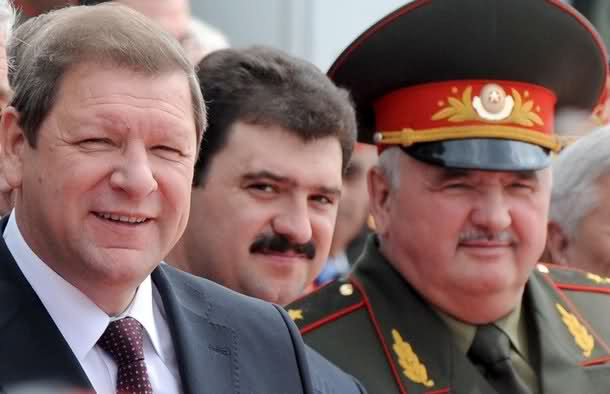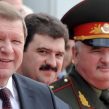
Is There a Third Force in Belarus?
Publication: Eurasia Daily Monitor Volume: 9 Issue: 112
By:

Belarusian Minister of the Interior Ihar Shunievich announced recently that on July 3, national Independence Day, some 2,600 prisoners are to be released (RIA Novosti, June 12). The statement raised the hopes of some that the remaining political prisoners in Belarus might be on the list of those to be set free, but there is little indication of any mellowing of the Alyaksandr Lukashenka regime. The event indicates that little has changed – a policy of moderation followed by repressions has been in place for some time.
But it also raises questions about the nature of the regime. Various labels have been applied to the structure in place since 1996, when after further amendments to the Constitution, the late Russian Prime Minister Viktor Chernomyrdin negotiated a compromise between the President and the parliament, that essentially left the former with almost complete powers. Since that time, the regime has appeared relatively stable, but there is little consensus among analysts whether it constitutes a dictatorship and whether it is monolithic. Most important in this regard is the question of whether there are any alternative sources of power in Belarus.
A most obvious possible source of alternative power to President Lukashenka is the opposition, which is currently debating on whether to boycott or take part in the 2012 parliamentary elections. On June 11, on the first anniversary of the death of noted analyst Vitali Silitski, the newspaper Belorusy i Rynok republished one of his articles, originally written a decade ago in the journal Adkrytae Hramadstva. Silitski was a supporter of parliamentary elections, even when conducted under conditions of duress and difficulty, as will undoubtedly be the case later in 2012. He wrote that “dictators” – he had no problem using that word – hold elections because they overestimate their support, and periodically “dictators” need evidence of their legitimacy in the eyes of their own people and the international community. He argued that even a fruitless outcome for an opposition in such circumstances could initiate the process of liberalization (Belarusy i Rynok, June 11-17). Still, for the opposition, the ritual can often seem futile because the elections are carefully stage-managed, even during the formation of the initial election commissions.
Another Belarusian analyst, Siarhei Bohdan, sees potential forces for change outside the opposition. He maintains that the current structure is far from monolithic and cites former presidential candidate Andrey Sannikau, who stated in 2010 that below the ministerial level there are a number of very competent and well-qualified people who often seem at odds with official policies. Even at the ministerial level, some of the appointees are independent-minded, such as Minister of Culture Pavel Latushka, who speaks fluent Belarusian in public. Another leader, who is something of an enigma, is Prime Minister Mikhail Myasnikovich, a former president of the National Academy of Sciences, but also the man who ran the campaign of Lukashenka’s main opponent in 1994, the then Prime Minister Vyacheslau Kebich. Bohdan notes that Myasnikovich is exceptionally independent and far from being a mere acolyte of the President (Belarus Digest, May 17).
It has been evident for some time, on the other hand, that the most powerful figure immediately below the President, is his son Viktar, aged 36, whose official position sounds innocuous – Assistant to the President on National Security Issues. Viktar’s influence may have been behind what has been described as a “purge” of the Interior Ministry over the past year and its apparent subordination to the KGB, an agency also reputedly under the control of Viktar Lukashenka. On May 11, the President dismissed Interior Minister General Anatol Kuleshau, who had reportedly been seriously ill at the start of the year (udf.by, January 17). Kuleshau’s replacement, Ihar Shunievich, worked in the ministry until five years ago, but since then has been an employee of the KGB. The conclusion of a report by Kamil Klysinski of the Polish-based Center for Eastern Studies is that the evident consolidation of the forces of Viktar Lukashenka is a setback for those who favor economic reforms and improved relations with the West (OSW Centre for Eastern Studies, May 16).
Perhaps of equal importance is that after eighteen months of internal turmoil and confrontations with the opposition and other groups, the President wishes to have around him people he trusts fervently. Whether there are any real threats to his power is debatable – despite the alleged storming of the parliament building by crowds of demonstrators after the 2010 elections, the subsequent mass arrests, a “terrorist attack” last year and the extreme powers allocated to the KGB to round up opponents of the regime, real and imagined (Moscow Times, October 20, 2011). Neither of Lukashenka’s sons has demonstrated any inclination for the presidency. In fact his second son, Dmitry, who is 32, has a menial position as head of the presidential sports club, and his most frequently publicized image is in an ice hockey uniform. It is the President’s third and youngest son Mikalay (born in 2004), who is the most favored and accompanies his father regularly on official occasions (see https://www.belarus-tv.by/eng/president.asp?id=66518).
Plainly, the current structure is focused on the security forces, among which the KGB is the most powerful. Yet, there is no official, unified government position on many issues. Cabinet ministers are often chided for failure to show initiatives, meaning that they are not always expected to take directions from above. Because of his frequent speeches and image of omnipresence, Lukashenka is often perceived as the sole determiner of state policy, despite the many contradictions in his statements. Certainly he has exceptional powers. Yet, the Belarusian state is run, essentially, by public servants, many of whom are not opposed to economic reforms. Though rarely in the public eye, this apolitical “third force” stands between the more polarized players: the President and the opposition.
In the past, when such figures have taken on a political role, the regime has dealt with them summarily and much more harshly than with detained oppositionists, as the cases of the “disappeared” leaders Viktar Hanchar and Yuri Zakharanka demonstrate. Hanchar was Lukashenka’s campaign manager in 1994. But as Deputy Chairman of the Parliament, he had emerged as a major and charismatic opponent five years later during a time of constitutional crisis when Lukashenka refused to hold presidential elections at the end of his first term. Hanchar was abducted on September 16, 1999, together with his friend, the entrepreneur, Anatol Krasouski. Zakharanka was dismissed as Minister of Defense and had joined the opposition United Civil Party prior to his disappearance in 1999. Both former regime insiders are presumed dead. The two figures had come out openly into the opposition. Today one can assume that there are dozens of personnel following the orders of the President, but it does not necessarily indicate that they are his supporters or in agreement with his policies. The loyal coterie around the leader is much smaller than it appears even if, for the present, it is politically inert.




